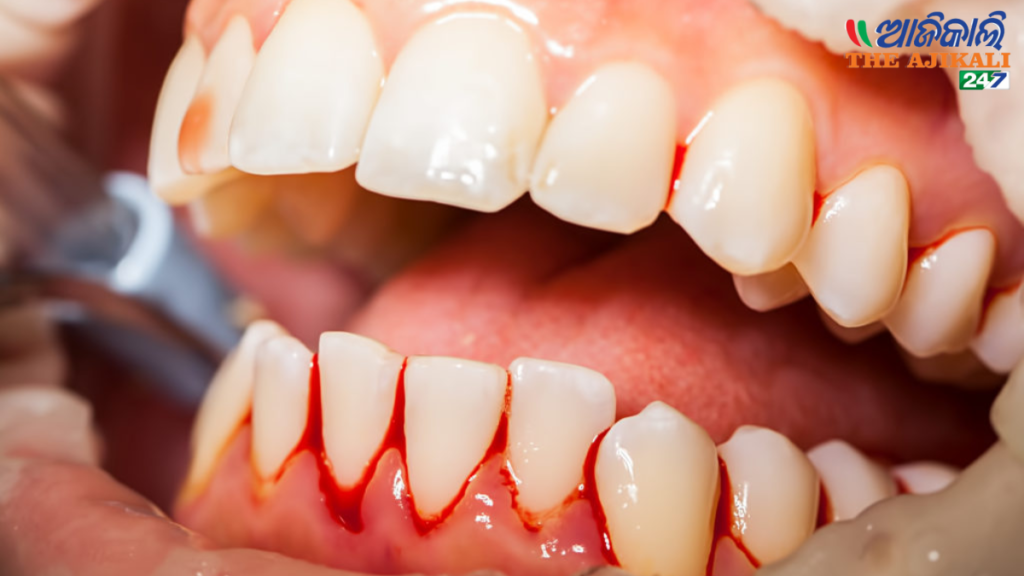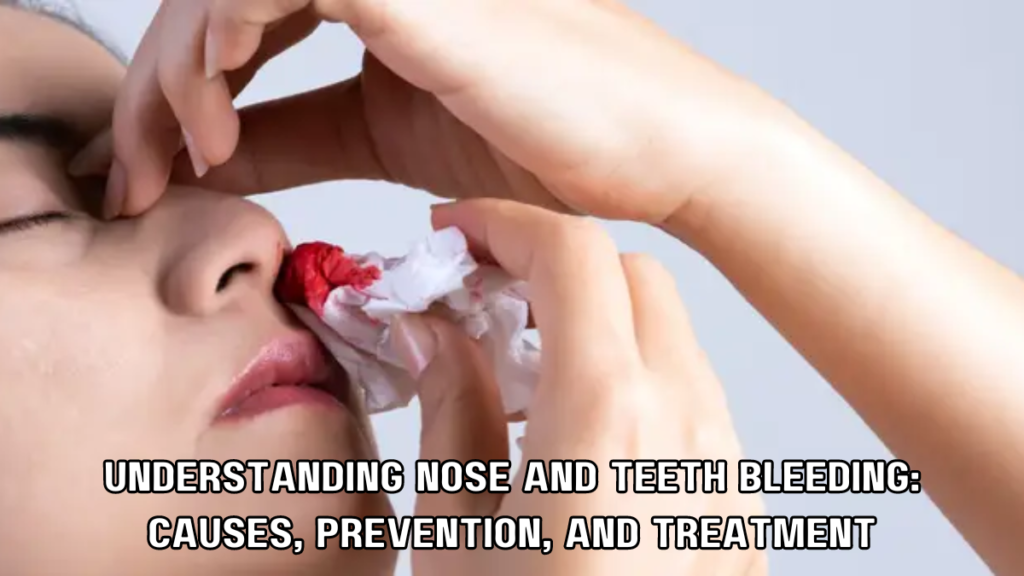Introduction:
Bleeding from the nose or teeth can be alarming and uncomfortable, but it is a common issue that most people experience at some point in their lives. Understanding the causes, preventative measures, and treatments for these types of bleeding can help you manage and reduce their occurrence. Let’s delve into the reasons behind nose and teeth bleeding, and explore ways to handle them effectively.
Causes of Nose Bleeding:

Nosebleeds, medically known as epistaxis, can be triggered by various factors:
- Dry Air: Dry, indoor air can dry out nasal membranes, leading to crusting that can cause bleeding when scratched or picked.
- Nasal Irritation: Allergies, colds, or sinus infections can inflame the nasal passages, increasing the likelihood of bleeding.
- Trauma: Any injury to the nose, whether from an accident, sports, or even vigorous nose blowing, can result in a nosebleed.
- Medications: Blood-thinning medications, such as aspirin and anticoagulants, can make you more prone to nosebleeds.
- Underlying Health Conditions: Conditions like hypertension, blood clotting disorders, or certain genetic conditions can cause frequent nosebleeds.
Causes of Teeth Bleeding:

Bleeding gums or teeth often indicate underlying dental issues:
- Gingivitis: This mild form of gum disease is caused by plaque buildup, leading to inflammation and bleeding gums.
- Periodontitis: If gingivitis is left untreated, it can progress to periodontitis, a severe gum infection that can damage the soft tissue and bone supporting the teeth.
- Poor Oral Hygiene: Inadequate brushing and flossing can lead to plaque and tartar buildup, causing gum irritation and bleeding.
- Vitamin Deficiencies: A lack of vitamin C (scurvy) or vitamin K can lead to bleeding gums.
- Medications: Some medications, like anticoagulants, can cause your gums to bleed more easily.
- Hormonal Changes: Pregnancy, menstruation, and menopause can cause hormonal changes that increase gum sensitivity and bleeding.
Prevention of Nose and Teeth Bleeding:
Preventative measures can significantly reduce the occurrence of nose and teeth bleeding:
For Nose Bleeding:
- Humidify Your Environment: Use a humidifier in your home, especially during winter, to keep nasal passages moist.
- Stay Hydrated: Drink plenty of water to maintain hydration.
- Avoid Nasal Irritants: Stay away from smoke, strong chemicals, and other irritants.
- Nasal Care: Apply a small amount of petroleum jelly inside your nostrils to keep them moist.
For Teeth Bleeding:
- Maintain Oral Hygiene: Brush your teeth twice daily and floss regularly to prevent plaque buildup.
- Regular Dental Check-ups: Visit your dentist for regular cleanings and check-ups to catch and address any issues early.
- Healthy Diet: Eat a balanced diet rich in vitamins and minerals, particularly vitamin C and K.
- Proper Brushing Technique: Use a soft-bristled toothbrush and avoid brushing too aggressively.
Treatment of Nose and Teeth Bleeding:
When bleeding occurs, appropriate first aid can help manage the situation effectively:
Treating Nose Bleeding:
- Stay Calm: Panicking can increase blood pressure and worsen the bleeding.
- Sit Up: Sit upright and lean forward slightly to prevent blood from flowing down the throat.
- Pinch Your Nose: Pinch the soft part of your nose shut for 10-15 minutes. Breathe through your mouth and avoid checking if the bleeding has stopped too soon.
- Cold Compress: Apply a cold compress to your nose and cheeks to constrict blood vessels and reduce bleeding.
- Seek Medical Help: If the bleeding persists for more than 20 minutes or is due to a significant injury, seek medical attention.
Treating Teeth Bleeding:
- Rinse with Salt Water: A saltwater rinse can reduce inflammation and help heal gums.
- Apply Pressure: If a specific area is bleeding, apply a clean, damp gauze and press gently.
- Topical Treatments: Over-the-counter gels can provide relief and promote healing.
- Visit Your Dentist: Persistent or severe bleeding should be evaluated by a dental professional.
When to Seek Medical Attention:
While occasional bleeding can often be managed at home, frequent or severe cases warrant professional evaluation. Consult a healthcare provider if:
- Nosebleeds are frequent and unexplained.
- You experience prolonged or heavy bleeding.
- You have signs of an underlying health condition, such as easy bruising or excessive bleeding elsewhere.
- Gum bleeding persists despite good oral hygiene practices.
Conclusion:
Nose and teeth bleeding can be distressing, but with proper understanding and management, you can minimize their occurrence and impact. Prioritize preventative measures, maintain good hygiene, and seek professional help when necessary to keep your nose and gums healthy.

